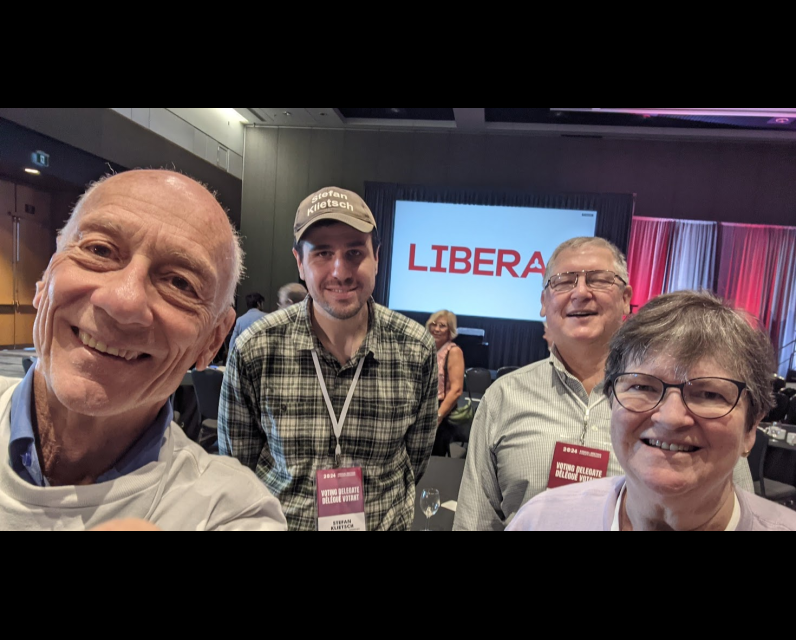Unpublished Opinions
Stefan Klietsch grew up in the Ottawa Valley outside the town of Renfrew. He later studied Political Science at the University of Ottawa, with a Minor in Religious Studies. He ran as a candidate for Member of Parliament for Renfrew-Nipissing-Pembroke three times from 2015 to 2021. He recently graduated with a Master of Arts in Political Science at the University of Carleton.
I am running for President of the Ontario Liberal Party – here is why

Every major provincial party is failing Ontarians
For two straight elections in 2022 and 2025, the majority of Ontarians registered with Elections Ontario have not been inspired to vote. Clearly all four major parties have been failing to fundamentally represent the interests of most Ontarians, including the one of which I am a 6-year member, the Ontario Liberal Party. (I have documented from personal experience elsewhere the failures of the internal governance of the Green Party of Ontario.)
What is particularly remarkable about the mindset of the OLP is what could be described as a lack of (adequate) introspection and internal soul-searching in the face of its recent losses. Unlike the Liberal Party of Canada, the OLP is not in any sense the “natural governing party” of its respective domain. The actual natural governing party of Ontario is the Progressive Conservative Party, and historically it takes a perfect storm to bring the OLP into power. Yet the OLP operates itself not as if it wants to bring on the rain, but as if it is just complacently waiting for the paint to dry. Leading authorities and other members have excused recent losses as poor circumstances of misfortune; for example, blaming this year’s loss on the circumstances of the early election call. But rationalizations are not plans for improvement.
I do not consider any one person as solely to blame for the party’s defeats, whether the Leader, the incumbent President, or others. Every person of authority within the OLP has been operating with the mainstream support and like thinking of many others. And this party does not operate as a personality cult unlike some others I have previously been involved with. But the failure of the OLP to win elections is easy to explain when taking seriously its governance shortfalls.
Internal governance is the problem
As a political party that has gone a generation now without a single membership or delegated vote on policy resolutions, the OLP has been undemocratic by the standards of many Canadian provincial and federal political parties. If you were to compare the OLP to the increasingly-fringe People’s Party of Canada for example, we would see that the governance differences would include the OLP possessing a Constitution and having elections for Council and Leader. But we would also see that both parties never hold membership votes on policies, and that the vast majority of members never get a vote on anything other than leadership votes (and even there turnout is a problem). When one takes seriously the lack of power for most OLP members, it is practically a miracle that the party gets anywhere close to 30% of the popular vote – and not the least surprising when it loses.
I suspect that over the long term, the OLP’s governing Executive Council as an institution has suffered from excessive turnover. The current Council is seemingly empty of persons (beyond Bob Wright) who experienced and witnessed the growth of the OLP from the opposition benches at the turn of the century, and entirely empty of persons involved in the federal Liberals’ return to power in 2015. Admittedly electing myself would not change that, as neither is true of myself either. And obviously, the incumbent President has put truly immense work hours and effort into the position.
Still, fresh ideas need to be introduced somewhere, and I doubt that observers of the current President’s work would testify that she has new ideas for governance that have not been allowed by others around her to be implemented yet. I also do bring forth experience as someone who has tried to help smaller parties grow, and failed to bring about such growth not due to excess personal influence but due to my influence being rejected. (Try to imagine an alternate universe where the Green Party of Ontario did not expel me in the middle of an official Deputy Leader candidacy in 2018 that I was plausibly going to win, and imagine then if that party would have continued to stagnate electorally. There’s at least some possibility that things would have turned out differently for that party.)
The platform for my presidential campaign
So, what are the fresh ideas that I would bring forward to the OLP? They are as follows:
- Pushing for a policy resolution process that is widely accessible to members in good standing with non-controversial ideas, opening to submissions no later than 2026.
- Opening Executive Council meetings to observance by general members and increasing accessibility of meeting minutes. (If the smaller Green Party of Canada can do this, so can the OLP.)
- Creating an official members-only discussion forum where mainstream members can debate and collaborate on the direction of the party.
- Reducing class and time limitation barriers to participation in nomination contests, leadership contests, and other party functions by relying less on fundraising thresholds in favour of screening candidacies via petitions of member support versus member opposition, such that those with more opposing than supporting member signatures are screened out. And use the same for/against petition process to screen policy resolutions for a 2026 conference.
- Publishing member-approved policies within a public Policy Book.
- Eliminating the Leader’s salary in favour of encouraging the Leader to delegate work and to only volunteer for the party on a part-time basis.
While policy resolutions are not the only crucial tool of policy formulation within a successful political party, they are a key unavoidable cornerstone. Resolutions processes are how a party does a trial run on how a debate would play out in the wider public, which cannot be replicated by opinion polls which only give snapshots of opinion in one time and place. Resolutions processes are also a core means of drawing policy solutions that have been overlooked by the media and which have missed the attention of existing leadership.
Both the incumbent President and myself would respect the will of the delegates of the Constitutionally-mandated leadership review: if most delegates vote for a leadership contest in this AGM, then there will be a leadership contest. However, I would support a process where the incumbent Leader would be permitted to run in the ensuing contest. And, it would be my long-term objective to change the OLP Constitution to make leadership contests automatically reoccur at least every other AGM. (Under the existing OLP Constitution, Council has special authority to submit constitutional amendments, which increases the stakes in the election of who gets to lead that body.) Leadership contests should be a mundane and constant fact of life, not once-in-a-generation opportunities where everything is at stake.
The final pitch
I hope that this campaign comes across as positive and constructive in tone. I have criticisms to make of the manner in which the OLP conducts its elections, but I am confident that if I lose, it will not be the result of personal discrimination and more a result of the class of persons that OLP AGM elections screen for (i.e. highly-connected, super-accessible in-person at OLP events, willing to invest money on campaign materials). Interestingly, declaring oneself for OLP President is a surprisingly simple process, whereas I previously needed 10 members from across the province to nominate myself for the GPO Deputy Leader candidacy. I give my gratitude to those who take my candidacy seriously where others might not bother with the least attention or interest.
The stakes are high in setting the tone for the rebuild of the party leading up to 2029. Council needs to borrow on long-lasting experience but the decisions, it has consistently made desperately need to change.
**Updated September 10: I removed the pledge for “Loosening the restrictions upon Councillors’ communication via email and other digital formats with respect to discussing governance matters with OLP members”, as it was based on a factual misunderstanding.



Comments
Be the first to comment